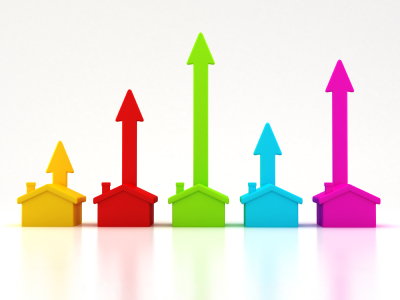The turnaround in home prices has been one of the major narratives of the housing recovery, but could it be a curse disguised as a blessing?
By most measures, U.S. home prices fell by more than a third from the latter months of 2006 to early 2012, but after bottoming out early last year, home prices have been on a virtual tear, rising more aggressively with each passing month. Home prices were up nearly 10 percent in January compared to the year before, according to CoreLogic, which is predicting a yearly increase of more than 11 percent for February.
Although that is certainly welcome news – trust us, we were getting weary reporting about home price declines! – some analysts are raising the warning bells and asking one simple question: are home prices rising too quickly?
Big Home Price Increases = Housing Bubble?
One of the more noted probes into the home-price explosion came from Diana Olick, CNBC’s real estate reporter, who in an oft-read piece on home prices brought up a shiver-inducing term – “bubble.” Because low inventory, rather than high consumer demand, is the primary driver of today’s increasing home prices, Olick fears that those increases are unsustainable, particularly with REO investors across the country pushing up prices in many of the nation’s hardest hit markets.
“Healthy housing market gains are historically driven by increasing employment and income, not by lack of supply; the latter leads to price bubbles,” she wrote.
Before we start running for the doom bunkers, though, we should point out one key point. Though home prices have been rising rapidly, it’s impossible their increase will mirror that of the housing boom years from 2001 to 2005, and for one simple reason – the absence of mortgage financing. Because banks are so strict with their lending standards, there is no financing available to reciprocate speculative buying from consumers, so economists are largely unafraid of another major bubble taking shape.
Pricing Out the Competition
What some analysts have pointed out, though, is the damaging effect that rising home prices can have on consumers, particularly those whose incomes are not rising at the same rate.
As Lawrence Yun, NAR’s chief economist, explained, rising rents and home prices are placing pressure on many consumers, who, faced with stagnant incomes, find their choices in many housing markets evaporating.
“It’s an unhealthy development for prices to rise this fast compared to people’s income growth,” Yun said.
“The greatest concern in the market is the inventory situation,” he also said. “Even if we see an increase in the spring and summer, if home sales hold at the [current] level or even a 5- to 6-month supply, price increases are guaranteed. We don’t want to see rapid appreciation in prices faster than income.”
Suffice to say, it’s an interesting housing market right now, one that could develop in any number of ways.

